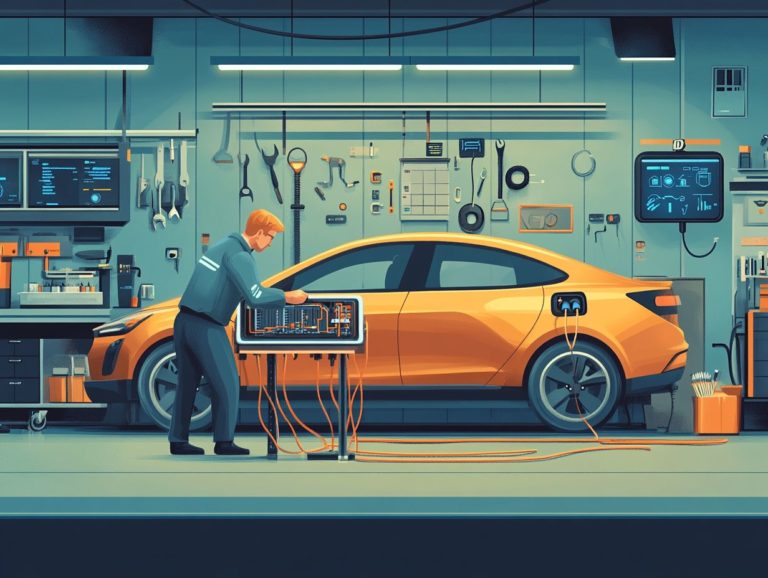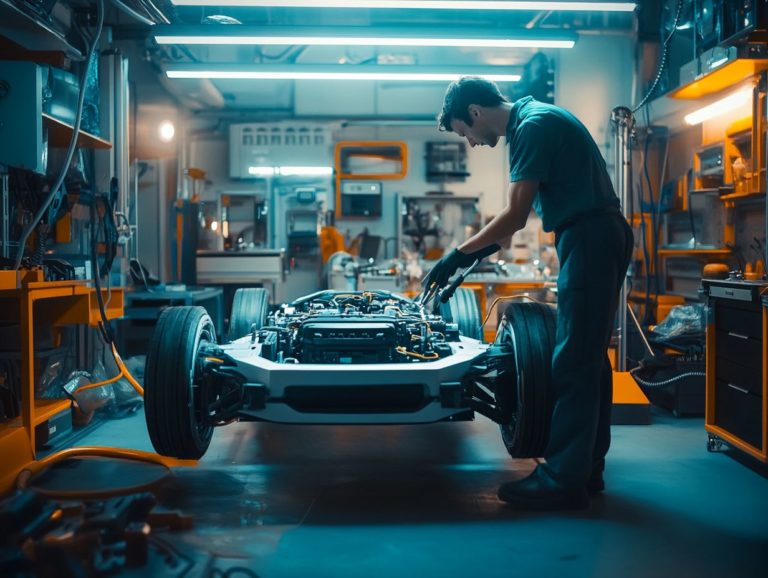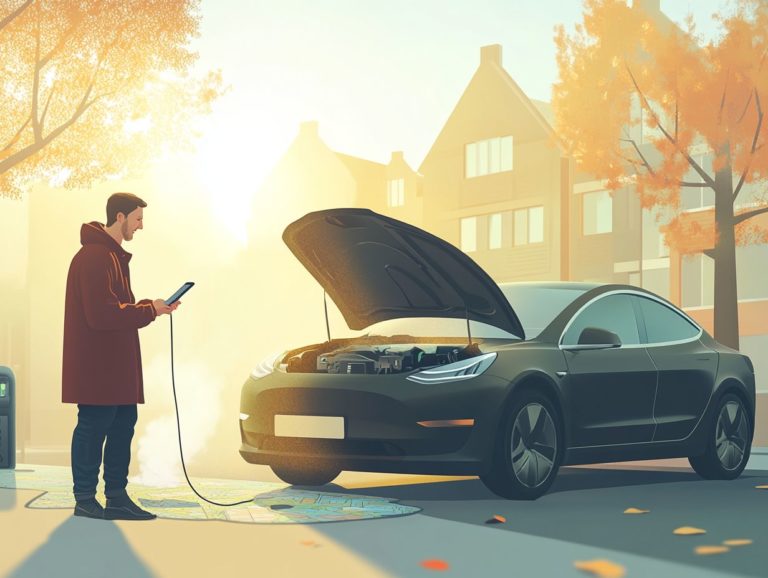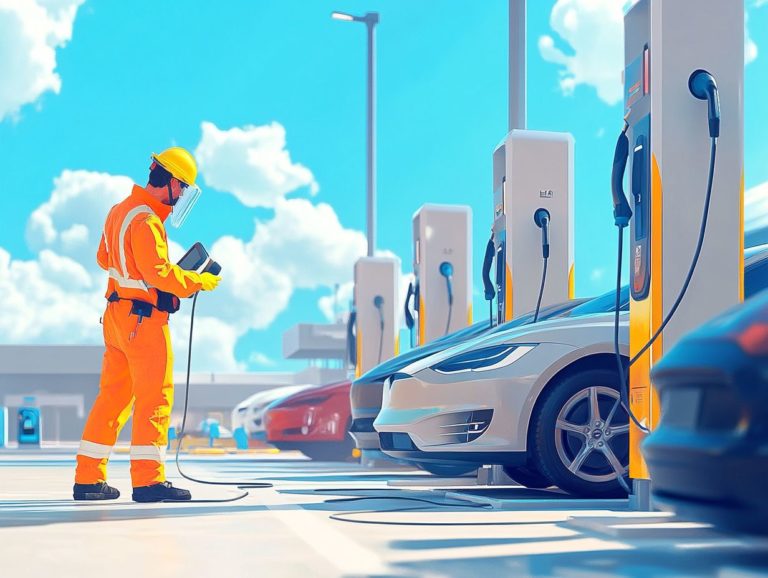understanding the costs of ev maintenance
Electric vehicles (EVs) are gaining popularity. It’s important to know how to maintain your EV.
Regular maintenance extends your EV’s lifespan and keeps it performing well. This guide covers what affects EV maintenance costs.
You ll learn about common tasks like battery care and tire rotations, plus tips to save money. Whether you’re new to EVs or a fan, this info will help you keep your vehicle in top shape.
Contents
- Key Takeaways:
- The Importance of Regular EV Maintenance
- Factors Affecting EV Maintenance Costs
- Common Maintenance Tasks for EVs
- Ways to Reduce EV Maintenance Costs
- Frequently Asked Questions
- What are the main cost drivers for EV maintenance?
- Are EVs more expensive to maintain than traditional gasoline vehicles?
- What factors can affect the cost of EV maintenance?
- Do EVs require regular maintenance like oil changes?
- How often should I expect to replace the battery in an EV?
- Can I save money on EV maintenance by performing it myself?
Key Takeaways:
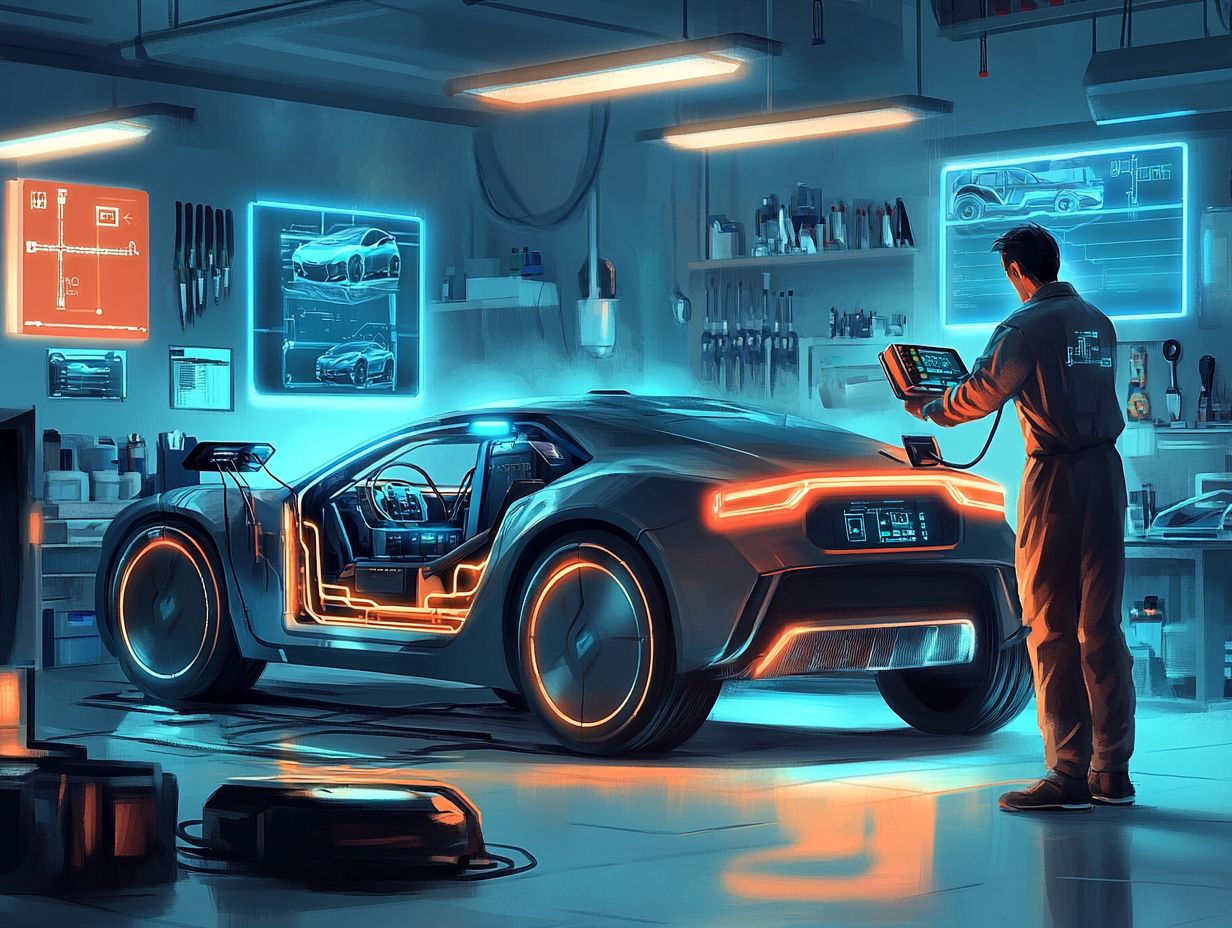
- Regular maintenance is crucial for the performance and longevity of EVs.
- Factors such as driving habits and type of EV can impact maintenance costs.
- To reduce EV maintenance expenses, follow a proper maintenance schedule and choose an EV with good warranty coverage.
The Importance of Regular EV Maintenance
Regular maintenance of electric vehicles (EVs) is essential for ensuring efficiency, longevity, and performance. You need to follow a maintenance schedule that focuses on unique components like the high-voltage battery and brakes that recharge your battery while slowing down.
Neglecting these vital services can lead to costly repairs and a frustrating driving experience. As the automotive industry changes, knowing these maintenance tasks is vital for anyone investing in electric technology.
Why Regular Maintenance is Essential for EVs
Regular maintenance directly influences EV efficiency and overall performance. Key components like the battery and regenerative braking systems need to operate at their best.
By routinely checking the battery’s health, you can sidestep unexpected failures that could lead to costly repairs or frustrating drops in range. Regular diagnostics help pinpoint potential issues before they become major problems, promoting greater longevity for your vehicle.
Staying updated on the latest technological advancements is also important. New software or battery technologies can significantly enhance performance and mitigate wear and tear.
Embracing recommended maintenance practices ensures a smoother driving experience and contributes to long-term savings, keeping your vehicle in peak condition for years to come.
Factors Affecting EV Maintenance Costs
Several factors influence your EV maintenance costs, which can vary significantly from those of gas-powered cars. To understand more about these expenses, you can explore what are the long-term costs of owning an EV?
These factors include the specific maintenance schedule tailored for EVs and how your driving history impacts your overall expenses.
Types of EVs and Their Maintenance Needs
Different types of electric vehicles (EVs), like the Chevrolet Bolt, Audi e-tron, Tesla, and Kia Niro, have unique maintenance needs based on their designs and technologies.
These distinctions often depend on battery types, drive systems, and overall engineering. For example, some models may require specific repairs or parts replacements based on their lithium-ion or solid-state battery configurations.
It’s essential for you as an owner to understand that a personalized maintenance schedule is critical for optimal performance and prolonging your vehicle’s lifespan.
Regular inspections and attention to these unique components can save you from expensive repairs down the line, highlighting the importance of knowing your model s specific requirements.
Driving Habits and Their Impact on Maintenance
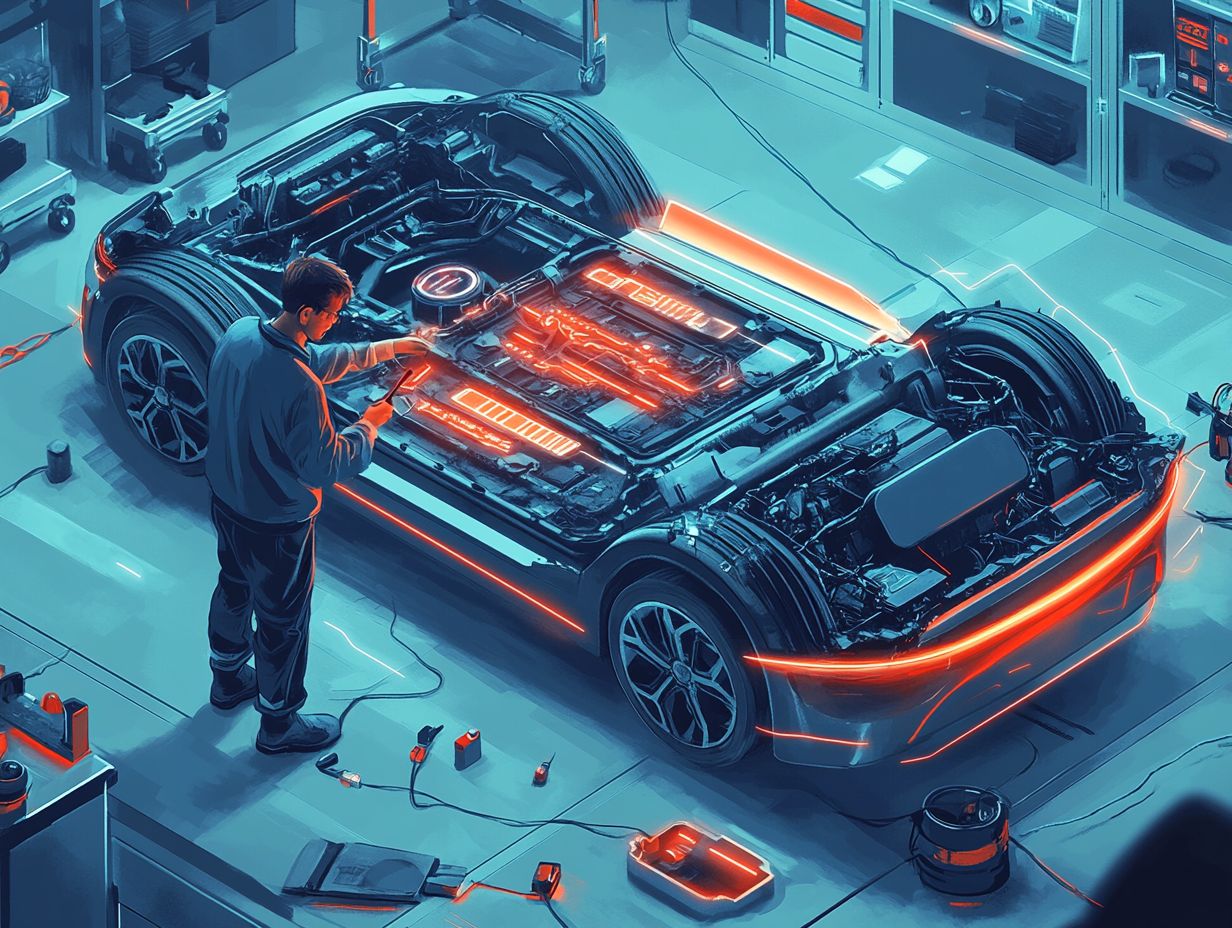
Your driving habits play a crucial role in the maintenance of your electric vehicle (EV). Aggressive acceleration and frequent fast charging can lead to unnecessary wear and tear on its components.
Adopting a smoother driving style enhances your vehicle’s efficiency and preserves the integrity of its systems. For instance, moderate acceleration and deceleration promote stable battery performance, ultimately extending its lifespan.
Be mindful of your charging habits! Opting for slower charging methods significantly minimizes strain on the battery. These adjustments can greatly reduce maintenance needs and diagnostics reports.
Taking a proactive approach to your driving behavior allows for a more sustainable and economical maintenance journey. It highlights the direct connection between your driving style and the longevity of your EV.
Common Maintenance Tasks for EVs
Regular maintenance tasks for your electric vehicle (EV) are essential for optimal performance and your safety.
Key activities include:
- Routine battery maintenance
- Tire rotations
- Brake inspections
Stay on top of these tasks to enhance your driving experience and prolong your vehicle’s life.
Battery Maintenance and Replacement
Battery maintenance is crucial for electric vehicles (EVs). The powerful battery directly influences both efficiency and overall driving range.
By caring for your battery, you ensure its longevity and optimal performance. This leads to a seamless experience on the road.
Regularly monitor battery health! Look for signs of wear, such as reduced capacity, unusual sounds, or warning lights. These could indicate that your battery needs some TLC.
Your charging habits, extreme temperatures, and environmental conditions all determine when your battery may require replacement.
Follow smart battery practices. Maintain good charging levels and avoid deep discharges to save on repair costs, which can range from $2,000 to $5,000.
Tire Maintenance and Rotation
Tire maintenance and rotation are essential for your electric vehicle (EV). They ensure optimal performance, safety, and efficiency. The unique weight distribution of EVs significantly affects tire wear, making it essential to pay attention to this detail.
Neglecting this vital maintenance leads to uneven wear and tear, compromising driving efficiency and increasing the risk of unsafe handling. EV owners should stick to a regular maintenance schedule, typically rotating tires every 6,000 to 8,000 miles, depending on driving habits and tire type.
This proactive approach extends each tire’s lifespan and enhances overall performance and comfort, allowing for a smoother ride.
Understanding how tire health impacts energy consumption leads to substantial cost savings. Well-maintained tires improve mileage and reduce replacement frequency.
Brake Maintenance and Replacement
Brake maintenance for electric vehicles (EVs) is crucial, given their unique regenerative braking systems that create different wear patterns compared to traditional vehicles.
Regular checks are essential to evaluate your brake pads and related components. This ensures everything operates at peak performance.
As an EV owner, be vigilant for signs like squeaking, reduced responsiveness, or vibrations during braking. These could signal that it’s time for a replacement.
Regular inspections extend your brake components’ lifespan and significantly enhance your overall safety.
Establish proper service routines to identify any irregularities in your brake system early on. This allows for proactive repairs and adjustments, ensuring a smooth and efficient driving experience every time you hit the road.
Ways to Reduce EV Maintenance Costs
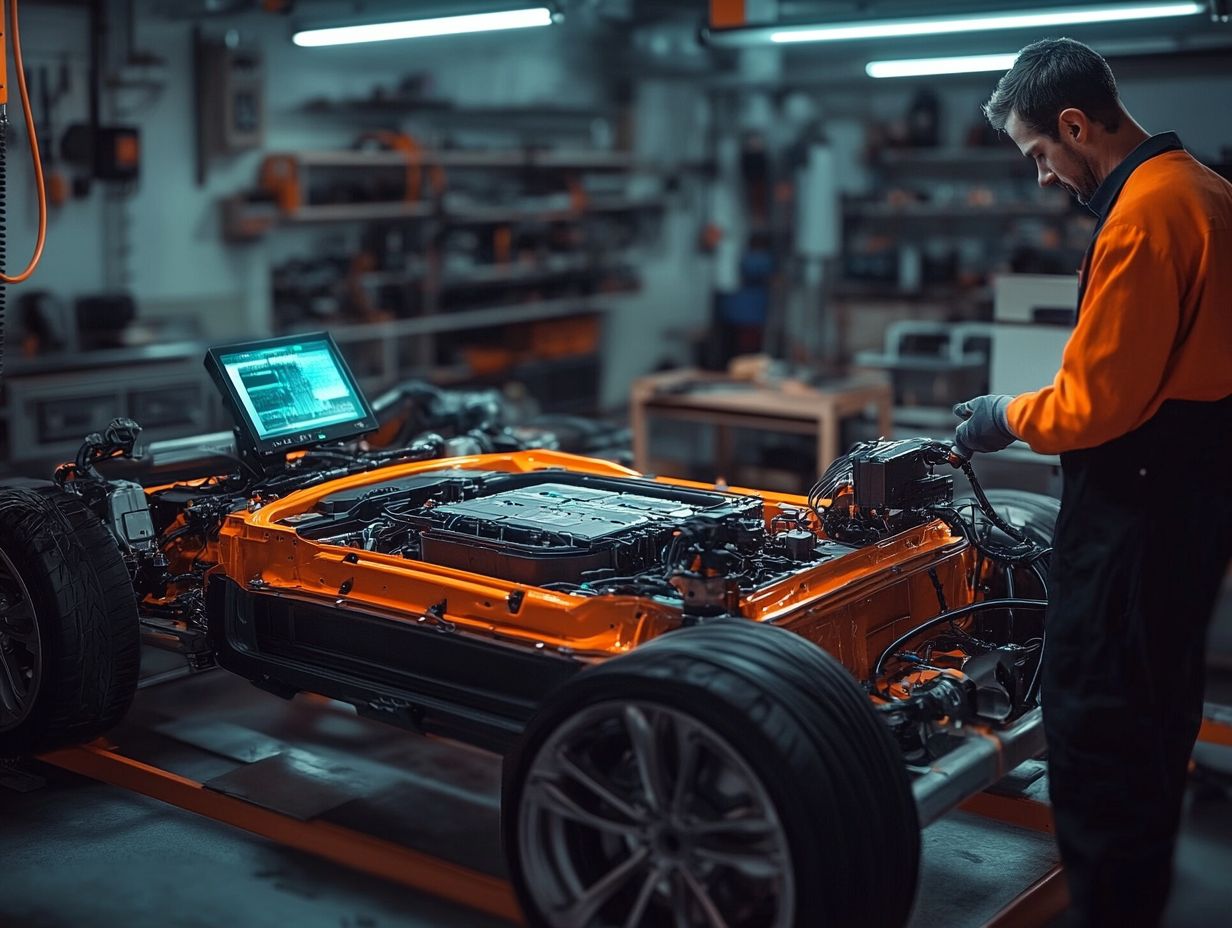
You have several effective strategies at your disposal to reduce electric vehicle (EV) maintenance costs.
Stick to a maintenance schedule and try simple DIY tasks to save money while keeping your vehicle in top shape.
Proper Maintenance Schedule and DIY Tasks
Establish a structured maintenance schedule. Engage in DIY tasks to manage your electric vehicle (EV) maintenance costs effectively.
By routinely assessing your driving history, you can determine how often inspections and maintenance tasks are needed. Simple DIY tasks like checking tire pressure and cleaning charging ports are easy to do at home.
Leveraging diagnostics reports information your car generates about its performance helps you spot issues before they become expensive. Crafting a personalized maintenance schedule not only aids in tracking these tasks but also serves as a valuable reminder for essential parts replacement.
This proactive approach keeps your vehicle in peak condition and drastically reduces the chance of surprise breakdowns!
Choosing the Right EV and Warranty Coverage
Choosing the right electric vehicle (EV) and understanding warranty coverage can have a profound impact on your maintenance costs and overall ownership experience.
As you explore the multitude of models available today, it s essential to consider not only the initial purchase price but also the long-term maintenance needs associated with owning an EV.
Take a closer look at the warranty options provided by manufacturers; these can offer valuable protection for components that are unique to electric vehicles.
By comparing different insurance rates and evaluating potential savings from reduced maintenance and fuel costs, you can make a more informed decision.
Assessing the longevity and reliability of various EV models will enable you to fully enjoy the advantages of an environmentally-friendly vehicle while remaining comfortably within your budget.
Frequently Asked Questions
What are the main cost drivers for EV maintenance?
The main cost drivers for EV maintenance include battery replacement, tire replacement, brake system maintenance, and understanding the role of EV maintenance in safety, along with electrical system repairs.
Are EVs more expensive to maintain than traditional gasoline vehicles?
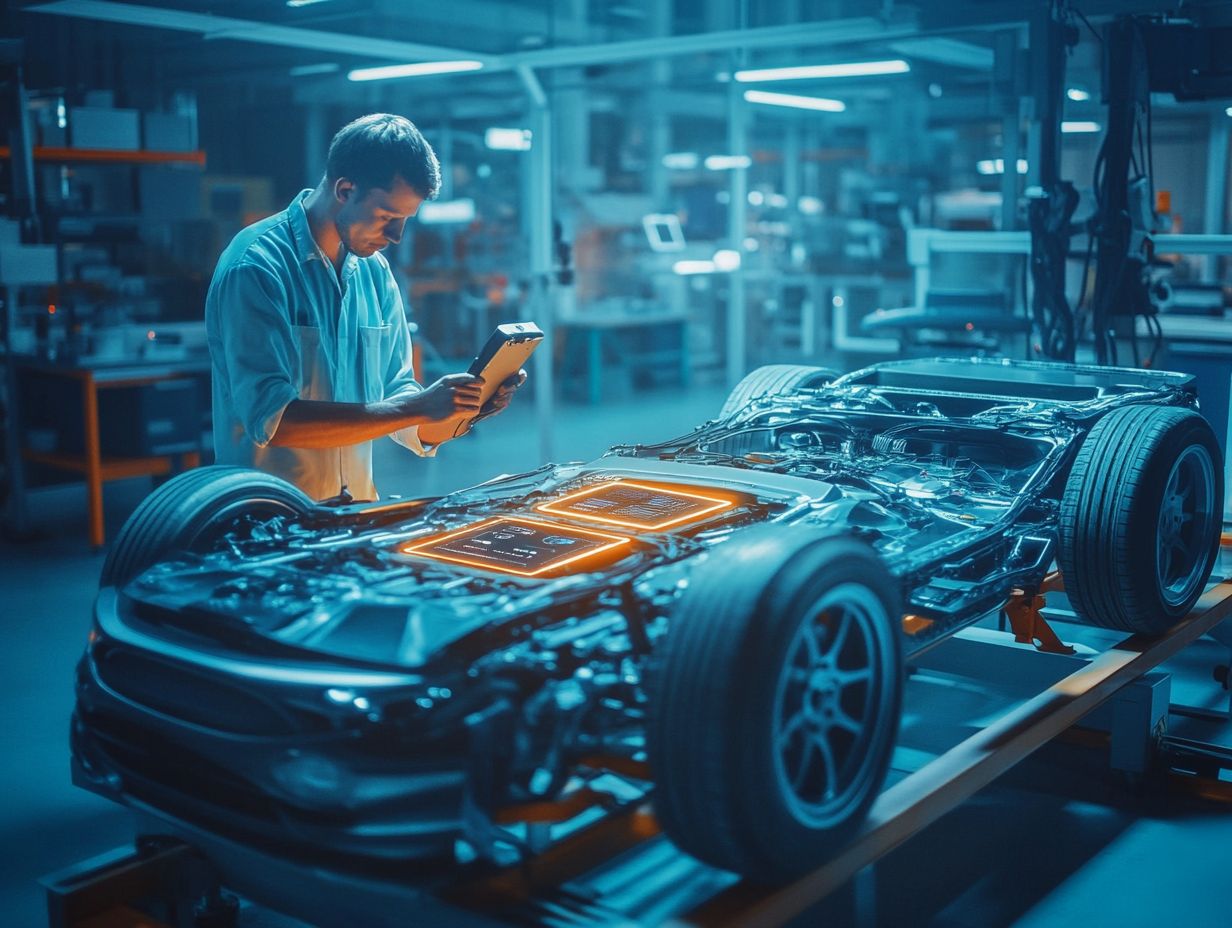
Generally, EVs have lower maintenance costs compared to traditional gasoline vehicles due to their simpler design and fewer moving parts.
What factors can affect the cost of EV maintenance?
The cost of EV maintenance can be affected by the model and age of the vehicle, driving habits, and the availability of certified EV repair shops in the area, making it important to understand the lifespan of EV components.
Do EVs require regular maintenance like oil changes?
No, EVs do not require regular oil changes like traditional gasoline vehicles. However, they still need periodic maintenance such as brake fluid and coolant top-ups, and inspections of the battery and electrical systems.
How often should I expect to replace the battery in an EV?
The lifespan of an EV battery can vary depending on usage and driving habits. However, most EV manufacturers provide warranties for their batteries for at least 8 years or 100,000 miles.
Can I save money on EV maintenance by performing it myself?
While some basic maintenance tasks can be done by the owner, EVs are complex vehicles that require specialized tools and knowledge. It is recommended to have maintenance and repairs done by certified EV technicians to ensure safety and proper performance.
Ready to save on your EV maintenance? Start your proactive journey today!

